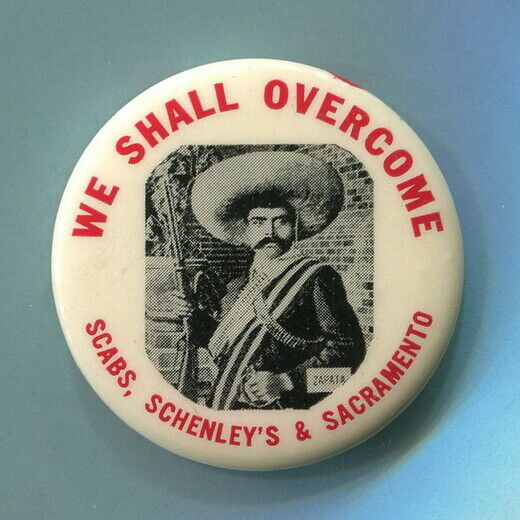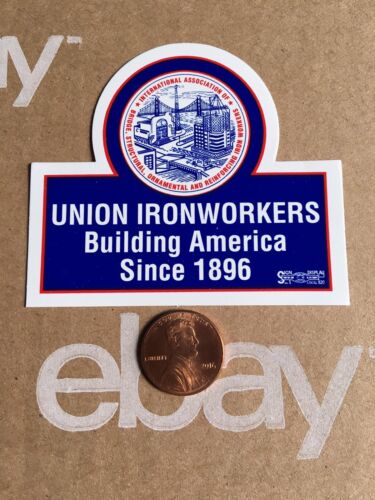-40%
1965 -6 United Farm Workers Zapata Strike at Schenley's March on Sacramento Pin
$ 26.37
- Description
- Size Guide
Description
THIS LISTING BEGAN ON JULY 6, 2021 ANDWILL END WITHIN 30 DAYS
,
ON OR BEFORE AUGUST 6, 2021,
IF THE ITEM IS NOT SOLD
OFFERED FOR SALE IS THIS
1 3/4 INCH CELLULOID PINBACK BUTTON
IN WHAT I BELIEVE TO BE REALLY GREAT SHAPE.
HOWEVER, THAT IS JUST MY OPINION.
SEE PHOTO FOR CONDITION
, AND YOU BE THE JUDGE. NOTE: BACK IS IN REALLY NICE SHAPE TOO, WITH SOME MINOR OXIDATION ON THE METAL BACK.
IF YOU HAVE ANY QUESTIONS, PLEASE CONTACT ME BEFORE BIDDING OR BUYING.
RETURNS ARE NOT ACCEPTED UNLESS THE ITEM IS NOT AS DESCRIBED OR SHOWN IN THE PHOTOS OR HAS SIGNIFICANT DAMAGE OR DEFECTS NOT VISIBLE IN THE PHOTOS OR OTHERWISE DESCRIBED.
GUARANTEED AUTHENTIC AND ORIGINAL AS DESCRIBED
.
Check out my other Political and Social Protest and Cause items listed on eBay.
This EARLY and SCARCE PIN was issued by the United Farm Workers in 1965 - 1966 in support of its efforts to organize grape pickers in Delano.
The pin refers to scab workers breaking the UFW's picket lines, the
boycotting of Shenley Industries
, a major grower of grapes and producer of wine, and
Cesar Chavez's march from Delano to Sacramento
in 1966 to call attention to organizing efforts in Delano.
The pin has nice graphics with photo of
Mexican Revolutionary Zapata
, and also reads
WE SHALL OVERCOME
, a slogan borrowed from the Civil Rights Movement of the time.
In the
f
all, winter
1965-66
the Delano strike continued. Chavez began to attract support from outside the valley, from labor, church, student and civil rights activists. United Auto Workers President Walter Reuther went to Delano to support the strikers.
The strikers begin boycotting the assorted products of Schenley Industries, a major area wine grape grower
.
In March-April 1966,
Chavez and a band of strikers embarked upon a 340-mile pilgrimage from Delano to the steps of the state Capitol in Sacramento
to draw national attention to the plight of farm workers. During the march and
after a four-month boycott, Schenley negotiates an agreement with NFWA–the union’s first contract
. Thousands of supporters join the marchers on the steps of the Capitol in Sacramento on Easter Sunday.
DELANO GRAPE STRIKE
Collective bargaining rights for
most hourly workers
in the United States were first given legal protection in
1933
by Section 7a of the National Industrial Recovery Act (NIRA).
When the National Labor Relations Act (NLRA) was
amended in 1935
, it
specifically exempted agricultural workers
due to pressure from the "farm bloc" in Congress. Although a number of attempts were made in the 1920s, 1930s, and 1940s to organize farm laborers, these efforts were unsuccessful.
In
August 1966
, the
National Farm Workers Association (NFWA)
and
Agricultural Workers Organizing Committee (AWOC)
, two unrecognized and relatively minor labor unions claiming organizing jurisdiction over farm workers in California,
merged to form
the
United Farm Workers Organizing Committee
(the predecessor organization to the
United Farm Workers
).
Adopting the philosophy of
pacifism
in the face of often violent reaction to its organizing efforts and engaging in
strikes, hunger strikes, boycotts and secondary boycotts
(including the successful Delano grape strike),
marches, rallies and cutting-edge public relations campaigns
, the
United Farm Workers
(
UFW
) began organizing large numbers of agricultural laborers into unions.
The
strike lasted for five years
and was characterized by its grassroots efforts which gained the movement national attention.
In
June 1969
, about 25 small growers broke ranks with the rest of the industry and singed contracts with the UFW.
In July 1970, the strike resulted in a victory for farm workers, due largely to a consumer boycott of non-union grapes, when a collective bargaining agreement was reached with major table grape growers, affecting more than 10,000 farm workers.
The UFW believed that success over the Delano grape growers would lead hundreds of growers to recognize the union and negotiate contracts with the union.
The Delano grape strike is most notable for the
effective implementation and adaptation of boycotts
, the
unprecedented partnership between Filipino and Mexican farm workers
to unionize farm labor, and the resulting creation of the UFW labor union, all of which
revolutionized the farm labor movement in America.
This underground pinback button pin or badge relates to the Hippie (or Hippy ) Counterculture Movement of the psychedelic Sixties (1960s and Seventies (1970s). That movement included such themes and topics as peace, protest, civil rights, radical, socialist, communist, anarchist, union labor strikes, drugs, marijuana, pot, weed, lsd, acid, sds, iww, anti draft, anti war, anti rotc, welfare rights, poverty, equal rights, integration, gay, women's rights, black panthers, black power, left wing, liberal, etc. progressive political movement and is guaranteed to be genuine as described.
THIS IS MY HOBBY AND IS
NOT A BUSINESS
. THIS AND MY OTHER ITEMS ON EBAY ARE FROM MY PERSONAL COLLECTIONS AND WERE NOT INITIALLY ACQUIRED BY ME FOR RESALE. PROCEEDS GO TO BUY OTHER STUFF I AM INTERESTED IN COLLECTING.
I HAVE BEEN A LONG TIME MEMBER OF
A. P. I .C. (AMERICAN POLITICAL ITEMS COLLECTORS)
. IF YOU ARE NOT A MEMBER, YOU SHOULD CONSIDER JOINING.
IT IS A GREAT ORGANIZATION!
SHIPPING:
ITEMS WILL BE SAFELY PACKED TO AVOID DAMAGE DURING SHIPPING. ITEMS ARE SHIPPED BY
FIRST CLASS MAIL
.
SHIPPING TO DESTINATIONS
WITHIN THE UNITED STATES
IS
.50
OUTSIDE THE UNITED STATES
, SHIPPING IS
.00.
I WILL COMBINE SHIPPING CHARGES:
BUT TO RECEIVE THE DISCOUNT
, YOU MUST WAIT TO PAY
FOR MULTIPLE ITEMS
UNTIL I SEND AN INVOICE WITH REDUCED SHIPPING CHARGES
, OR
YOU ARE WELCOME TO REQUEST ONE
AND PAY UPON RECEIPT.
ONCE YOU PAY MULTIPLE SHIPPING CHARGES,
I CANNOT REFUND THEM IN WHOLE OR IN PART.
SO
PLEASE
WAIT TO PAY
.
THANK YOU FOR YOUR INTEREST.
The strategy and methods that the Deacons employed attracted the attention and concern of the Federal Bureau of Investigation (FBI), which authorized an investigation into the group’s activities. The investigation stalled, however, when more influential black power organizations such as US and the
Black Panther Party
emerged after the
1965 Watts Riot
. With public attention, and the attention of the FBI focused elsewhere, the Deacons lost most of their notoriety and slowly declined in influence. By 1968 they were all but extinct. In 2003 the activities of the Deacons was the subject of a 2003, “Deacons for Defense.” - See more at: HTTPS://www.blackpast.org/aah/deacons-defense-and-justice#sthash.s6D3h3ZZ.dpuf
On July 10, 1964, a group of African American men in Jonesboro,
Louisiana
led by Earnest “Chilly Willy” Thomas and Frederick Douglas Kirkpatrick founded the group known as The Deacons for Defense and Justice to protect members of the
Congress of Racial Equality (CORE)
against Ku Klux Klan violence. Most of the “Deacons” were veterans of
World War II
and the
Korean War
. The Jonesboro chapter organized its first affiliate chapter in nearby Bogalusa, Louisiana led by Charles Sims, A.Z. Young and Robert Hicks. Eventually they organized a third chapter in Louisiana. The Deacons tense confrontation with the Klan in Bogalusa was crucial in forcing the federal government to intervene on behalf of the local African American community. The national attention they garnered also persuaded state and national officials to initiate efforts to neutralize the Klan in that area of the Deep South.
The Deacons emerged as one of the first visible self-defense forces in the South and as such represented a new face of the
civil rights
movement. Traditional civil rights organizations remained silent on them or repudiated their activities. They were effective however in providing protection for local African Americans who sought to register to vote and for white and black civil rights workers in the area. The Deacons, for example, provided security for the 1966 March Against Fear from Memphis to Jackson,
Mississippi
. Moreover their presence in Southeastern Louisiana meant that the Klan would no longer be able to intimidate and terrorize local African Americans without challenge.
The strategy and methods that the Deacons employed attracted the attention and concern of the Federal Bureau of Investigation (FBI), which authorized an investigation into the group’s activities. The investigation stalled, however, when more influential black power organizations such as US and the
Black Panther Party
emerged after the
1965 Watts Riot
. With public attention, and the attention of the FBI focused elsewhere, the Deacons lost most of their notoriety and slowly declined in influence. By 1968 they were all but extinct. In 2003 the activities of the Deacons was the subject of a 2003, “Deacons for Defense.” - See more at: HTTPS://www.blackpast.org/aah/deacons-defense-and-justice#sthash.s6D3h3ZZ.dpuf
On July 10, 1964, a group of African American men in Jonesboro,
Louisiana
led by Earnest “Chilly Willy” Thomas and Frederick Douglas Kirkpatrick founded the group known as The Deacons for Defense and Justice to protect members of the
Congress of Racial Equality (CORE)
against Ku Klux Klan violence. Most of the “Deacons” were veterans of
World War II
and the
Korean War
. The Jonesboro chapter organized its first affiliate chapter in nearby Bogalusa, Louisiana led by Charles Sims, A.Z. Young and Robert Hicks. Eventually they organized a third chapter in Louisiana. The Deacons tense confrontation with the Klan in Bogalusa was crucial in forcing the federal government to intervene on behalf of the local African American community. The national attention they garnered also persuaded state and national officials to initiate efforts to neutralize the Klan in that area of the Deep South.
The Deacons emerged as one of the first visible self-defense forces in the South and as such represented a new face of the
civil rights
movement. Traditional civil rights organizations remained silent on them or repudiated their activities. They were effective however in providing protection for local African Americans who sought to register to vote and for white and black civil rights workers in the area. The Deacons, for example, provided security for the 1966 March Against Fear from Memphis to Jackson,
Mississippi
. Moreover their presence in Southeastern Louisiana meant that the Klan would no longer be able to intimidate and terrorize local African Americans without challenge.
The strategy and methods that the Deacons employed attracted the attention and concern of the Federal Bureau of Investigation (FBI), which authorized an investigation into the group’s activities. The investigation stalled, however, when more influential black power organizations such as US and the
Black Panther Party
emerged after the
1965 Watts Riot
. With public attention, and the attention of the FBI focused elsewhere, the Deacons lost most of their notoriety and slowly declined in influence. By 1968 they were all but extinct. In 2003 the activities of the Deacons was the subject of a 2003, “Deacons for Defense.” - See more at: HTTPS://www.blackpast.org/aah/deacons-defense-and-justice#sthash.s6D3h3ZZ.dpuf
On July 10, 1964, a group of African American men in Jonesboro,
Louisiana
led by Earnest “Chilly Willy” Thomas and Frederick Douglas Kirkpatrick founded the group known as The Deacons for Defense and Justice to protect members of the
Congress of Racial Equality (CORE)
against Ku Klux Klan violence. Most of the “Deacons” were veterans of
World War II
and the
Korean War
. The Jonesboro chapter organized its first affiliate chapter in nearby Bogalusa, Louisiana led by Charles Sims, A.Z. Young and Robert Hicks. Eventually they organized a third chapter in Louisiana. The Deacons tense confrontation with the Klan in Bogalusa was crucial in forcing the federal government to intervene on behalf of the local African American community. The national attention they garnered also persuaded state and national officials to initiate efforts to neutralize the Klan in that area of the Deep South. - See more at: HTTPS://www.blackpast.org/aah/deacons-defense-and-justice#sthash.s6D3h3ZZ.dpuf










